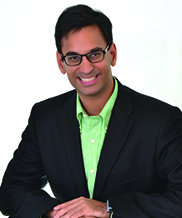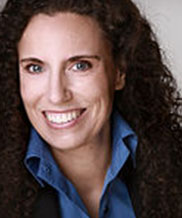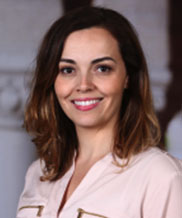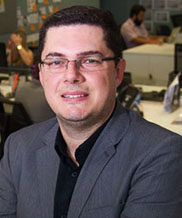Lightening Talks with Discussion: Global Perspectives
 Aman Kumar is Head of Operations Innovation in the Office of the CFO at SAP SE, where he focuses on consumerization, simplification, and business agility. He is also special advisor to the CIO of the Republic of Estonia and advisor to startups in Silicon Valley and Boston. Aman was previously the head of strategic marketing at MobileIron, Inc., an enterprise mobile startup in Silicon Valley. Working with the CEO and executive team, he was responsible for strategic planning, consumer product definition, and application partnerships for the organization before its IPO in 2014. In his talk, Aman discusses Workforce Pathways Through Constraint: Stories from Europe and Marginalized Communities…
Aman Kumar is Head of Operations Innovation in the Office of the CFO at SAP SE, where he focuses on consumerization, simplification, and business agility. He is also special advisor to the CIO of the Republic of Estonia and advisor to startups in Silicon Valley and Boston. Aman was previously the head of strategic marketing at MobileIron, Inc., an enterprise mobile startup in Silicon Valley. Working with the CEO and executive team, he was responsible for strategic planning, consumer product definition, and application partnerships for the organization before its IPO in 2014. In his talk, Aman discusses Workforce Pathways Through Constraint: Stories from Europe and Marginalized Communities…
1. How SAP builds an innovation business with the worker-friendly European culture.
2. How Estonia builds an innovation country with ~1.5 million citizens.
3. How stuttering was once a handicap and now being spun more positively by corporations and the media (then I tie that together with some SAP specific programs like Autism at Work etc.).
 Sabine Remdisch is a Professor of Personnel and Organizational Psychology and Head of the Institute for Performance Management at Leuphana University Lüneburg. Her current focus is leadership and working in the digital world. She is a guest researcher at the H-STAR Institute at Stanford University, Silicon Valley, and is a member of the Leadership Garage. She teaches leadership, personnel development and coaching. It accompanies companies in the field of digital change and the development of a digital corporate culture. In this talk, Sabine examines German SME Perspectives…
Sabine Remdisch is a Professor of Personnel and Organizational Psychology and Head of the Institute for Performance Management at Leuphana University Lüneburg. Her current focus is leadership and working in the digital world. She is a guest researcher at the H-STAR Institute at Stanford University, Silicon Valley, and is a member of the Leadership Garage. She teaches leadership, personnel development and coaching. It accompanies companies in the field of digital change and the development of a digital corporate culture. In this talk, Sabine examines German SME Perspectives…
1. The “German Mittelstand” is a cornerstone of the German economy, but currently facing challenges attracting and retaining a high-skilled workforce.
2. According to our study on SME employer attractiveness, the following characteristics make a workplace highly attractive: Trust in management, interesting and motivating work environment, identifying with company values, high reputation of the company, good relationship with colleagues and supervisors, family friendliness.
3. SME’s must also keep up with digital progression in order to remain attractive by focusing on five factors that help to be successful in the digital world: Workplace, Leadership, Culture, Collaboration, and Empowerment.
 Raquel Coelho is a PhD student and Lemann Fellow at Stanford Graduate School of Education. She holds a M.A. degree in International Comparative Education from Stanford University and an undergraduate degree in Portuguese Language and Brazilian Literature from the Federal University of Minas Gerais, Brazil. Over the past ten years, she has taught and tutored children, youths, and adults in formal and informal settings within both public and private sectors of Brazil, Czech Republic, and the United States. Raquel is particularly interested in helping students – especially those in public and under-resourced schools – to communicate ethically and persuasively. In her talk, Raquel looks at Transforming the Training Infrastructure of Brazil’s Transportation System…
Raquel Coelho is a PhD student and Lemann Fellow at Stanford Graduate School of Education. She holds a M.A. degree in International Comparative Education from Stanford University and an undergraduate degree in Portuguese Language and Brazilian Literature from the Federal University of Minas Gerais, Brazil. Over the past ten years, she has taught and tutored children, youths, and adults in formal and informal settings within both public and private sectors of Brazil, Czech Republic, and the United States. Raquel is particularly interested in helping students – especially those in public and under-resourced schools – to communicate ethically and persuasively. In her talk, Raquel looks at Transforming the Training Infrastructure of Brazil’s Transportation System…
1. Brazil’s transportation sector is vital to its role in global provisioning of food, energy and minerals, as well as to domestic economic vitality.
2. On land, sea, and air, technological transformations are changing the mindset and skills needed by executives, engineers, and service workers.
3. SEST/SENAT, the national agencies that support training for transportation workers, are reframing the training infrastructure for this key business sector.
 Marcelo Tournier is Director of SESI (Social Service of Industry) Innovation Center for Health Technologies. SESI Santa Catarina is a private, non-profit organization responsible for education and wellbeing programs for almost one million manufacturing employees in Brazil, improving working conditions and productivity. Marcelo supports a multi-cultural network with more than 20 countries and Brazilian Governmental Entities related to wellbeing and Innovation. Now, he is helping the ecosystem to connect insights from various sources, amalgamating them into new solutions to build a skilled, resilient and healthy workforce. In his presentation, Marcelo examines An Ecosystem-based University using an Experience Platform…
Marcelo Tournier is Director of SESI (Social Service of Industry) Innovation Center for Health Technologies. SESI Santa Catarina is a private, non-profit organization responsible for education and wellbeing programs for almost one million manufacturing employees in Brazil, improving working conditions and productivity. Marcelo supports a multi-cultural network with more than 20 countries and Brazilian Governmental Entities related to wellbeing and Innovation. Now, he is helping the ecosystem to connect insights from various sources, amalgamating them into new solutions to build a skilled, resilient and healthy workforce. In his presentation, Marcelo examines An Ecosystem-based University using an Experience Platform…
1. The main challenge of Innovative Habitats and Ecosystems is workforce education in a very dynamic environment.
2. The New University model, inspired by living ecosystems, can focus on real life experience training and education of talented people.
3. Engagement is a key factor to improve the performance of the learning process of the workforce. Authentic Immersive Learning Environments can enhance Engaging Experiences through the integration of stories, Gamification and ubiquitous Digital Technologies.